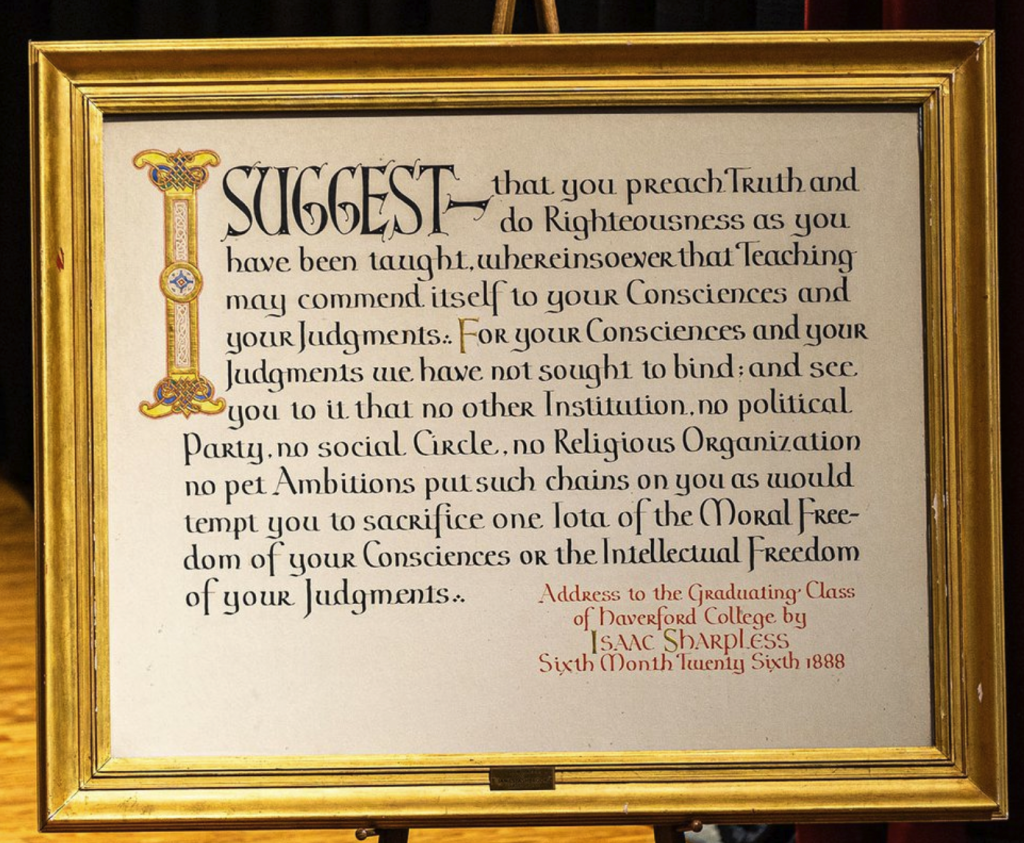Message given at Durham Friends Meeting, February 18, 2024
“He swore an oath.” What does that mean and why does anyone do it? “He swore an oath.” That’s what’s on my mind this morning.
Notice that “he swore an oath” could mean two quite different things. It could mean, he said a lot of bad words in frustration or anger, words that no one should say and certainly not in a bad, loud tone of voice. Or “he swore an oath” could mean he mean that, on a solemn and important occasion, he assured us that he would do all that was expected of him. Like when the newly elected President stands on the steps of the Capitol and says certain words with his hand on the Bible in front of the Supreme Court Chief Justice and tens of thousands of others. “He swore an oath:” oddly, two quite different meanings.
This morning, it’s the second meaning I have in mind: the solemn and important occasions, the assurances that are given, the magic words that are spoken. Just the second meaning.
Here’s an example, an oath a witness in a criminal trial is likely to be asked to give: “I swear that the evidence that I shall give shall be the truth, the whole truth, and nothing but the truth, so help me God.”
Notice, of course that God is invoked here. The oath is given knowing that God is right there as a witness. The implication is that if I swear this oath and don’t do what I’m swearing I’ll do, there be divine punishment. (That’s why it is a solemn occasion when we swear an oath. The original – 14th century – meaning of solemn” is “performed with due religious ceremony or reverence.”)
Of course, we Quakers know – don’t we – that God is always right at hand, paying attention to all that we do. So what’s the point of an oath? And you probably know that Quakers from our earliest days have refused to swear oaths. We have often gotten in trouble for it. In the 17th century, many Quakers went to jail simply because they would not swear an oath that was asked of them.
Why is that? Well, because of Matthew 5:37: “37 All you need to say is simply ‘Yes’ or ‘No’; anything beyond this comes from the evil one.”
Or James 5:12: “12 Above all, my brothers and sisters, do not swear—not by heaven or by earth or by anything else. All you need to say is a simple “Yes” or “No.”
And because of these two verses in the Bible, and because of how Friends understand what God is saying through them, Quakers have a testimony against swearing oaths. Here’s how the Advices from NEYM’s F&P puts it: ) “Let us maintain integrity in word and deed. Holding to the simplicity of truth, let us keep free of oaths” (p 207).
And here’s how Philadelphia Yearly Meeting’s 1955 Faith and Practice put it: “Friends regard the custom of taking oaths as not only contrary to the teachings of Jesus but as implying the existence of a double standard of truth. Thus, on all occasions when special statements are required, it is recommended that Friends take the opportunity to make simple affirmations, thus emphasizing that their statements are only a part of their usual integrity of speech” (p20).
This admonition against swearing oaths is a part of our Testimony of Integrity. To swear an oath to tell the truth, Friends have believed for hundreds of years, is to imply that you might not be telling the truth when you do not swear an oath. That’s the ‘double standard.’ We believe we should always be telling the truth and telling it straightforwardly. Let your yes be yes and your no be no. Instead, we make simple affirmations when expected to ’swear an oath’, and we remind people that we endeavor always to speak the truth.
So Quakers don’t swear oaths, but other people do. What do these other people think they are doing in swearing an oath? I agree we shouldn’t swear oaths, but there’s something in oath swearing worth noticing. What do people think they are doing?
I want to acknowledge, in truth, that all this is on my mind and on my heart because the business of swearing oaths has been much in the news. And that’s because oath swearing is in the U.S. Constitution in several places.
The President is asked to swear this oath before taking office: “I do solemnly swear that I will faithfully execute the Office of President of the United States, and will to the best of my Ability, preserve, protect and defend the Constitution of the United States” (Article II, section 1, clause 8).
For members of Congress, the Constitution provides that they “shall be bound by Oath or Affirmation to support this constitution.” The exact words of that oath are up to Congress and here’s the current version: I do solemnly swear (or affirm) that I will support and defend the Constitution of the United States against all enemies, foreign and domestic; that I will bear true faith and allegiance to the same; that I take this obligation freely, without any mental reservation or purpose of evasion; and that I will well and faithfully discharge the duties of the office on which I am about to enter. So help me God.
This business of swearing oaths seems a little quaint, doesn’t it, a little old-fashioned. Maybe it made sense back when people really worried that God would strike them dead on the spot (maybe a lightning bolt?) if they had their fingers crossed when they swore an oath, or simply thought, ‘who is this God; this God will never catch me?’
So, again, why do we do this? Or more bluntly, if someone isn’t going to support the Constitution, why wouldn’t they just lie? Why does saying the words matter? Wouldn’t someone who lies be prepared to lie while taking the oath?
Think of what’s happening when you swear an oath. You are speaking in front of others, probably a crowd of people, some of them holding positions of importance. You know they will hear you say this oath. Maybe that puts you on your best behavior. Maybe even for selfish reasons, you care what they think. So shaming is at work.
You are also hearing yourself say the words. Maybe that doesn’t mean much, but maybe it does. It reminds you that you are promising to do the right things. So embarrassment is at work here.
And of course you are speaking out loud to God. Maybe that means something to you. If it does, then fear and awe, and the promise of redemption are at work here.
There’s an understanding of human nature bound up in our having this requirement to swear oaths in the Constitution. It’s an understanding that knows that people sometimes act selfishly or meanly. It’s an understanding that realizes people sometimes just do what’s best for themselves and the hell with anyone else.
But it’s also an understanding that knows that people can act honestly and generously, with the welfare of others fully in mind. The oath is an effort to call people to their best selves. The oath is sworn to draw someone to that best self. It’s an occasion to remember God is listening, and will remember. There’s a religious backdrop, no doubt about it, no matter what God you believe in.
I’m not trying to make a narrowly political or partisan point here, really, I’m not. I’m asking us to notice that in this business of oath swearing is a view of human nature that has a religious underlay that our Founders thought important, even as they also believed in the religious liberty voiced in the First Amendment. This view of human nature is far from cynical. I know there are days I can slip into thinking ‘everyone is just in it for himself.’ ‘What did I expect? Of course all politicians are corrupt’ always, always.
That’s not my best self, however, and it doesn’t expect that others have their own best selves. A different understanding of human nature is far more accurate. We Quakers believe that God can and will speak to each of us if we still ourselves and listen.
This business of oath swearing is a reminder that the Founders of our nation believed that people could stoop to selfish, corrupt behavior but also believed that people could be called to their best selves. Swearing an oath is one way to do that. There’s nothing magic about it; it doesn’t always work. We shouldn’t elect people who will swear a false oath. But when we elect someone who can act honestly and generously, let’s also ask them to swear an oath that they will promise to act out of their best selves. It nudges them in the right direction.
What else nudges us to be our best selves? We should think about that, even as we Quakers reject the swearing of oaths. We, too, believe, maybe more than most people, that we can all be called to our best selves, and we probably need nudges, too.
I believe we all have worst selves and best selves, selfish selves and loving selves. How do we find it in ourselves, regularly, to be at our best? That takes effort. It takes nudges, If oath swearing doesn’t do it for us, what does? For me, I know coming here on Sundays helps. I know prayer helps. I know our Quaker advices and queries help. I know having a spouse and friends with high expectations helps.
This is a challenge for each of us.
Also posted on the website of Durham Friends Meeting






